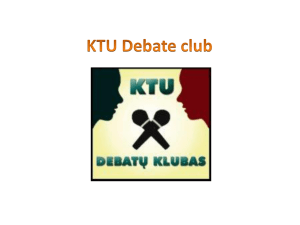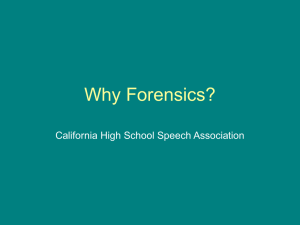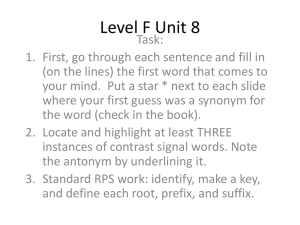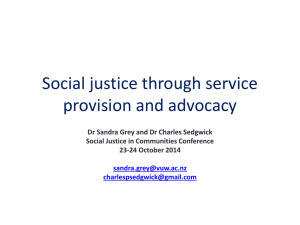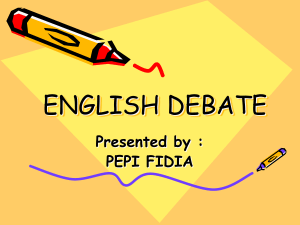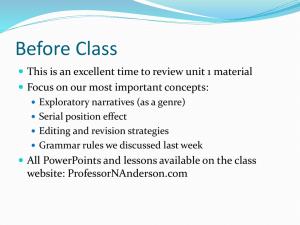Technology Achievement Standard
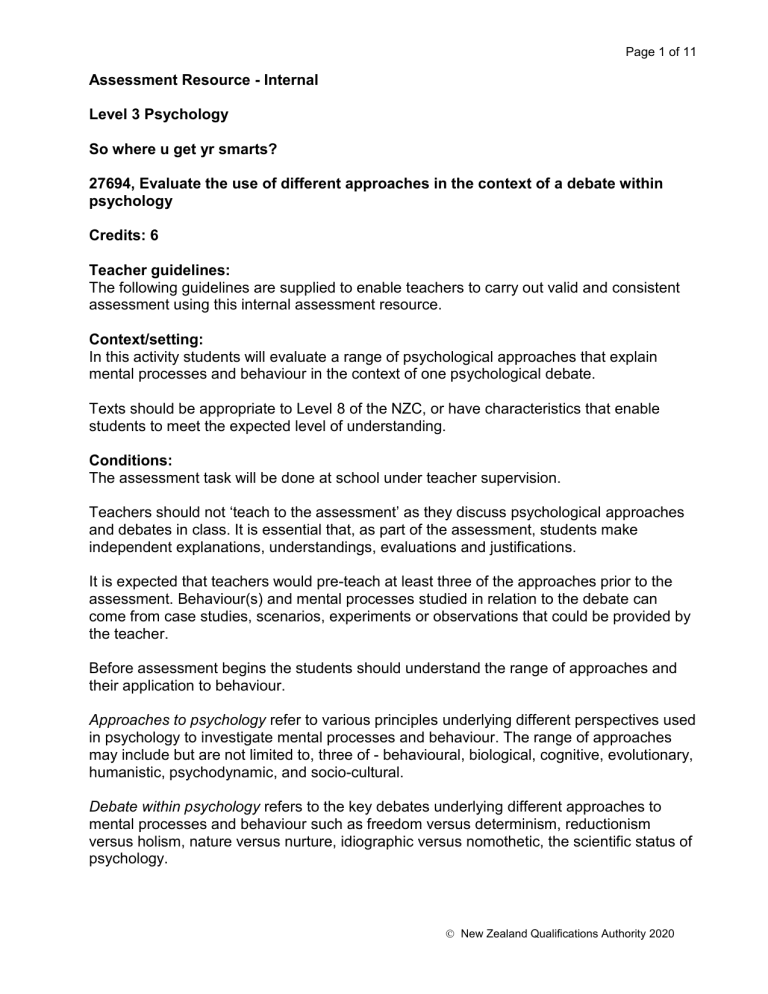
Page 1 of 11
Assessment Resource - Internal
Level 3 Psychology
So where u get yr smarts?
27694, Evaluate the use of different approaches in the context of a debate within psychology
Credits: 6
Teacher guidelines:
The following guidelines are supplied to enable teachers to carry out valid and consistent assessment using this internal assessment resource.
Context/setting:
In this activity students will evaluate a range of psychological approaches that explain mental processes and behaviour in the context of one psychological debate.
Texts should be appropriate to Level 8 of the NZC, or have characteristics that enable students to meet the expected level of understanding.
Conditions:
The assessment task will be done at school under teacher supervision.
Teachers s hould not ‘teach to the assessment’ as they discuss psychological approaches and debates in class. It is essential that, as part of the assessment, students make independent explanations, understandings, evaluations and justifications.
It is expected that teachers would pre-teach at least three of the approaches prior to the assessment. Behaviour(s) and mental processes studied in relation to the debate can come from case studies, scenarios, experiments or observations that could be provided by the teacher.
Before assessment begins the students should understand the range of approaches and their application to behaviour.
Approaches to psychology refer to various principles underlying different perspectives used in psychology to investigate mental processes and behaviour. The range of approaches may include but are not limited to, three of - behavioural, biological, cognitive, evolutionary, humanistic, psychodynamic, and socio-cultural.
Debate within psychology refers to the key debates underlying different approaches to mental processes and behaviour such as freedom versus determinism, reductionism versus holism, nature versus nurture, idiographic versus nomothetic, the scientific status of psychology.
New Zealand Qualifications Authority 2020
Page 2 of 11
Resource requirements:
Teachers will provide resources and/or opportunities to evaluate the range of approaches within the context of a psychological debate. Texts should be appropriate to Level 8 of the
NZC, or have characteristics that enable students to meet the expected level of understanding. Assessment of this standard also provides opportunities for students to develop aspects of the key competencies of the NZC.
Points raised may come from the following list of studies. This list is not inclusive.
Galton Published book Hereditary Genius (1869) http://www.hsl.virginia.edu/historical/eugenics/2-origins.cfm
(not sure if this is right or enough?)
Biological studies: ‘Wired for intelligence” New Scientist March 2009, 14 March. P 12
Lemonick, M.D. (1999) Smart Genes Time Sept 27 1999 48-52
Race: Jenson 1969 How much can we boost IQ and scholastic achievement? Harvard
Education Review 39 1
– 123.
Jensen. The g Factor: The science of mental ability , Arthur R Jensen, Politics and the Life
Sciences, Sept 1998 http://www.indiana.edu/~intell/jensen.shtml
Flynn Effect http://www.iapsych.com/iapap101/IAPAP1018.pdf
links to loads of research examining the effect, or this; http://www.indiana.edu/~intell/flynneffect.shtml
(an interactive resource)
The Bell Curve (book) The Bell Curve: Intelligence and Class Structure in American Life.
(1994) written by Richard Herrnstein and Charles Murray. http://www.indiana.edu/~intell/bellcurve.shtml
S.J Gould. Article -
New Scientist, May, 1982. ‘A nation of morons’, by Stephen Jay Gould.
Also The Mismeasure of Man , 1981, Stephen Jay Gould
Nutrition study The Guatamalan Study Brown and Pollitt 1996
Twin and Adoptive child studies Bouchard 1990 Thomas Bouchard http://iq-test.learninginfo.org/iq03.htm
McGurk 1975
Shields 1974
University of Minnesota Twin Study 1979
Winerman,L. A second look at twin studies. Monitor on Psychology. 35, 4 April 2004. http://www.apa.org/monitor/apr04/secong.html.
Orphanage study: Skeels and Dye (1993) (Active Psychology [Ed Taylor I. Longman1999] textbook.) Skeels H M, et al. A study of environmental stimulation: An orphanage pre school project. University of Iowa Child Studies 1938, Vol 15
New Zealand Qualifications Authority 2020
Page 3 of 11
Gender studies:
Spinney, L. “Venus and Mars Collide” New Scientist 5 March 2011 43-45.
Pfaff, D. [2010] Man and Woman: An inside story. Oxford University Press.
Cooijmans, P. Sex differences in intelligence.
http://paulcoooijmans.com/intelligence/sex_differences.html
Socioeconomic status and Education programmes: http://iq-test.learninginfo.org/iq03.htm
the Milwaukee project and Glenwood state school project on IQ.
Project Head Start (1965) where they taught the parents skills of extra stimulation.
Active Psychology [Ed Taylor I. Longman1999] textbook.
Haskins, R. [1989 Beyond metaphor: the efficacy of early childhood education. American
Psychologist 44, 274 – 282
Milwaukee project. Heber, 1960. University of Wisconsin
Glenwood State School project http://iq-test.learninginfo.org/iq03.htm
A case of privation in confined twins:The Czech Twins (Koluchova, 1972, 1991)
Retrieved from 22 October, 2009 http://www.feralchildren.com/en/showchild.php?ch=koluchova
Evolutionary Psychology and Intelligence Research, May-June 2010, American
Psychologist. Pg 279
General Resources www.pbs.org/wgbh/nova/genome/debate.html www.pbs.org/wgbh/pages/frontline/shows/medicating/readings/brainpolitics.html http://news.bbc.co.uk/2/hi/in_depth/sci_tech/2000/human_genome/760724.stm http://news.bbc.co.uk/2/hi/health/1079481 http://wilderdom.com/personality/L4-1IntelligenceNatureVsNurture.html
http://wilderdom.com/personality/L2-2SternbergTriachicTheory.html
Students should have the opportunity to receive feedback to prepare, select, review their work before assessment judgements are made. This should include practice opportunities as part of the teaching. There is prior to the formal assessment but after the teaching activities as a preparation task.
New Zealand Qualifications Authority 2020
Page 4 of 11
Additional information:
Teaching and learning guidelines that inform psychology as it is taught in New Zealand can be found at http://www.tki.org.nz/ncea/ .
Information on psychology as it is practiced in New Zealand is available from the New
Zealand Psychological Society, http://www.psychology.org.nz
.
Information on Maori-focussed psychological research available through Maori and
Psychology Research Unit http://www.waikato.ac.nz/wfass/subjects/psychology/mpru/
New Zealand Qualifications Authority 2020
Page 5 of 11
Level 3 Psychology
So where u get yr smarts?
27694, Evaluate the use of different approaches in the context of a debate within psychology
Credit: 6
Student Instructions Sheet
During your Psychology programme in class, your teacher will work with you on a variety of written, oral, visual and multi-media resources. You will do a wide range of activities in class which will help you.
Your teacher will also give you opportunities to evaluate distinctive features of approaches in relation to a given psychological debate.
Exploring approaches within a debate
As part of your Psychology programme your teacher will provide you with the opportunity to explore at least four approaches. You will learn about the context and the opposing arguments of the debate. You will learn to evaluate arguments using academic studies and related criticism.
Choosing approaches
In the assessment you will decide on three approaches [as a minimum] to discuss opposing arguments in the given psychological debate.
You will evaluate and give evidence as to their position within the given debate.
For Achieved your responses should:
identify and explain points, from different approaches, relevant to the debate being addressed,
the contribution of the points to each approach will be identified,
the explanations will be supported by research evidence,
a position in the debate will be stated.
For merit or excellence your responses may also:
explain comparative points from at least two approaches which are relevant to the debate with supporting evidence being provided with respect to: how this evidence supports the stated position in the debate.
evaluate the relative contribution of different approaches, with supporting evidence, in the context of the debate being addressed to generate a justified position on the debate.
the strength and importance of the points, how the points relate to the approaches,
New Zealand Qualifications Authority 2020
Page 6 of 11
Assessment guide
Achieved Achieved with merit Achieved with excellence
The evaluation considers points relevant to the different approaches, with reference to supporting research, in terms of their contribution to the debate within psychology and states a position on the debate.
The evaluation generates a reasoned position on the debate which includes:
a comparison of points from at least two approaches relevant to the debate in terms of their similarities and differences;
the strength and importance of the points;
consideration of the approaches on the basis
The evaluation generates a justified position on the debate which includes:
discussion of the relative contribution of different approaches to the debate being addressed;
consideration of the relative strength of supporting arguments;
stating a position on the debate, justified by research evidence.
of research;
consideration of the points from the theoretical basis in which the approach is grounded;
stating a position on the debate, supported by reasons.
Sample Task
The Psychological debate being studied is Nature-Nurture. The behaviours and mental processes being considered relate to Intelligence.
The task involves the collection of points in class in preparation for their evaluation within the final assessment task which will take the form of an essay.
You must include at least three approaches in the evaluation though you are not limited to three. These approaches may include: behavioural, biological, cognitive, evolutionary, humanistic, psychodynamic, and socio cultural.
Preparation tasks
Points being studied:
Here is an example of a partially completed table of behaviour being studied. Complete the blank table below with points about the chosen behaviour and approaches. The explanation for each point should (i) explain behaviour in the context of the approach and
(ii) its contribution to the debate.
New Zealand Qualifications Authority 2020
Page 7 of 11
7
8
6
5
Example:
Point and source
Large improvements in early childhood environment, whether enriched pre-school education or superior adoptive homes can increase intelligence by as much as 15 pts [Wahlstein 2002 pp257-258]
Mother ’s milk to infants as opposed to formula results in 8 pt gain in IQ [Quinn et al 2001] and mother ’s milk via tube as opposed to formula to low weight infants results in 10 pt gain in IQ
[Johnson 2001]
Explanation
Enriched and more stimulating environment with increased interaction results in learning developing at a much younger age.
Differences in nutritional value and provision of trace compounds also possibly improved immune response, improves neuron development.
Approach involved
Behavioural, learning developed at a much younger age
Biological, neural development improved
How explanation supports or informs the debate
Supports the Nurture side of the debate.
The large increase in IQ points shows that early learning can have a major influence on IQ
Supports Nature side of the debate, the ½ SD improvement is significant and shows the importance of early neural development.
4
3
1
2
Identify and provide explanation for at least six points relevant to the debate.
Point and source Explanation Approach involved
How explanation supports or informs the debate
New Zealand Qualifications Authority 2020
Page 8 of 11
Formal Assessment Activity
Write an essay in class under exam condition to evaluate at least 6 points arising from the consideration of the nature nurture debate with regard to intelligence.
This may include a range of points from at least 3 different approaches, presenting arguments from both sides of the debate. The approaches must be identified in relation to the points being raised. These points may be supported by reference to published academic studies.
The essay may include consideration of the explanation of the points, differences and similarities of the explanations. The essay may conclude with a supported opinion as to the balance of Nature and Nurture in human intelligence.
The essay should include:
an introduction clearly outlining the purpose of the essay
the body of the essay must contain reference to at least 6 points in the debate identifying the approach the point relates to and
a conclusion.
Check the assessment criteria to ensure you contain the elements necessary to gain the grade you seek.
New Zealand Qualifications Authority 2020
Page 9 of 11
Assessment schedule
27694, Evidence and judgement statements: Evaluate the use of different approaches in the context of a debate within psychology
The evaluation considers points relevant to the different approaches, with reference to supporting research, in terms of their contribution to the debate within psychology and states their position in the debate. e.g.
Achieved
The volume of grey matter in the brain, made up of processor cells, is heritable and correlates with certain elements of
IQ [biological] (NatureNeuroscience,
DOI:10.1038/nn758)
Enrichment programmes e.g.
Project Head Start: early intervention program
Produces increases in IQ of 7 pts
[Bronfenbrenner 1974 in Race and IQ
(ed.) Montague, A. 2002 Oxford
Achieved with Merit Ach Achieved with excellence
The evaluation includes a comparison of points from at least two approaches relevant to the debate in terms of their similarities and differences and includes an explanation of:
the strength and importance of the points;
the approaches on the basis of research
the points from the theoretical basis in which the approach is grounded
their reasoned position in the debate
Points from at least two approaches will be explained in terms of their similarities and differences with supporting evidence. These points will be relevant to the debate being addressed.
This may include:
an assessment of the strength and importance of points from the approaches in the consideration of intelligence,
an assessment of the points from the approaches from the research basis
The evaluation generates a justified position on the debate which includes:
discussion of the relative contribution of different approaches to the debate being addressed;
consideration of the relative strength of supporting arguments;
stating their position, justified by research evidence, in the debate.
Points from at least two approaches will be compared and contrasted.
This may include:
an assessment of the relative strength and importance of points from the approaches in the consideration of intelligence,
an assessment of the relative strength, how recent, and volume
[with respect to research support] of
New Zealand Qualifications Authority 2020
Page 10 of 11
University Press.]
[behavioural]
Milwaukee project. Heber, 1960s.
University of Wisconsin [behavioural]
Children in Milwaukee were identified with low IQ and coming from low socioeconomic backgrounds. Most of the children were from black single parent families. They made up 3% of the population but 33% of the lowest IQs in the city . Enrichment programmes over 5 yrs increased IQs on average 24 IQ points.
Comparing brain maps of identical twins compared to fraternal twins myelin integrity is genetically determined
[including corpus callosum], this correlates with IQ tests for abstract reasoning and overall intelligence. [ biological] ( Journal of Neuroscience vol
29 p2212]
Effects of sex on behaviour are measurable Rapoport, J.[biological]
(Neuron vol 67 p728) e.g. Verbal fluency
0.5 SD female>male, mental rotations
0.3 -0.9 SD male> female.
Flynn effect: IQ is increasing in all countries at about 3 IQ pts/decade.
[http://www.iapsych.com/iapap101/IAPA
P1018.pdf]. The biggest increase in those with abstract reasoning.
[cognitive].
an assessment of the points from the theoretical basis in which the approach is grounded.
From the evaluation generated, a reasoned position in the debate will be stated. the points from the approaches,
an assessment of the points from the relative perceived worth of the theoretical basis in which the approach is grounded.
Justification is supported by the relative weighting of research evidence presented.
For example candidates may evaluate the relative strength of points from the approaches with respect to the theory of intelligence being considered
From the biological approach the recent development of scanning technologies has led to a greater understanding of the differences in the brain to a range of measured cognitive abilities.
There is a range of research to be assessed with examples given for
“achieved”.
From the behavioural approach there is a wide range of research over time examining environmental factors such as socioeconomic status and schooling programmes. These have been statistically tested to give evidence to variation in measures of cognitive
For example the candidate may state their position in the debate of nature v nurture as: Ironically, genes get expressed to their optimum extent and have the major influence on an adult’s intelligence only when the environment, the ‘nurture’ has been good enough.
For example candidates may evaluate the relative strength of points from the approaches with respect to the theory of intelligence being considered. If
Sternberg’s Triachic theory is considered then points/approaches may be considered with respect to the three elements.
[N.B. Gardener’s theory of multiple intelligences should only from a point of historical contextual interest as it is now discredited on the basis of recent research].
New Zealand Qualifications Authority 2020
Page 11 of 11
Neisser suggests this due to the way we are saturated with more sophisticated visual images.
IQ varies with a number of environmental factors. Bouchard and
Segal (1985)
These variables are multifactorial and largely unrelated but not necessarily accumulative.
[behavioural]
IQ varies with length of schooling
[Harnquist 1968], [Baltes and Reinert
1969]. As schooling progresses more complex concepts and schema are developed. Cross reference SOLO taxonomy
[cognitive]. Also Jencks, et al showed a small drop in IQ across summer vacations for students.
During the formal operational stage of cognitive development, intelligence is demonstrated through the use of symbols in relation to abstract concepts.
[Piaget – cognitive development]. Also links to language development as symbolic representation of abstract concepts. [cognitive] ability. There is a range of research to be assessed with examples given for
“achieved”.
There are a number of studies such as the range of twin studies which assess both the biological and environmental factors influencing intelligence
Their position in the debate is explained through the clear comparison of points
In considering the relative strengths of the arguments then the recency and methodology of research can be considered, also other research that supports or critiques the research considered.
The justified position is generated through this evaluation.
Notes:
Evidence statements are indicative and not exclusive.
Distinctive points are exclusive to a perspective and do not generally apply to a different perspective.
New Zealand Qualifications Authority 2020

